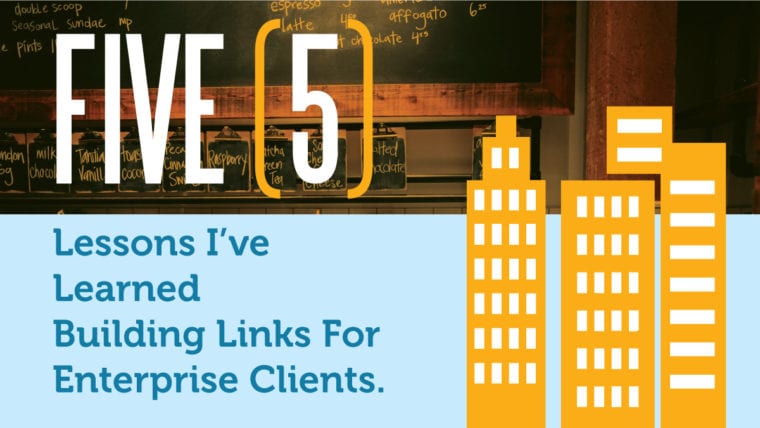Years ago, I founded a link building firm based on the simple concept of only pursuing real links on real websites with a relevant audience, using a customized approach.
Eric Ward was my mentor, and frankly, I felt there were a dearth of agencies taking low-quality approach. I noticed a need in the market, and believed I could help meet market demand.
This was pre-Penguin, so it wasn’t the popular strategy, but I strongly believed in creating value – for humans, the web, and my clients. I never wanted to waste my time chasing junk links.
This was a difficult decision and route. I often worried about the fate of my business. Spam still worked, and it worked well. But at the end of the day, building links for humans won out.
As with any successful business, I have been lucky in a few respects:
- I was able to hire truly wonderful people who share my ethos.
- My timing was serendipitous. Within a year, the first version of Penguin affirmed my business strategy.
- I was able to find great clients who believed in creating real value.
- I was able to prove the model, earning the results my clients need.
It wasn’t all sunshine and rainbows. We’ve made mistakes along the way, too, and were forced to learn and grow.
As my agency continued to grow, we’ve worked with a broad spectrum of clients, incorporating ever-larger businesses into our processes, who by very nature have different needs, goals, and expectations.
Today, I want to share the lessons I’ve learned working with large, enterprise-level clients. Lessons I believe vital to our success in dealing with these enterprise companies, and demonstrative of the developing needs in the online marketing world.
Making the transition from small business to enterprise-level clientage will require changes in your agency. We made mistakes that hopefully you can learn from as you transition to larger, more professional organizations.
The Keys To Our Enterprise Approach
I approach every campaign with research, creativity, and custom strategy. But enterprise clients are on another level entirely, requiring special experience, time, and care.
Multiple factors make enterprise link projects different from link acquisition for mom n’ pop shops or small-to-medium sized businesses (SMBs).
The biggest differences I’ve noticed building links for enterprise businesses is the scale, documentation, integration, and buy-in necessary.
The enterprise needs we had to meet as an agency:
- Up-the-ladder education (and selling) on the value of SEO, links, and particularly search
- Prioritizing quality, documentation, and a professional process
- Structuring and preparing for scalability
- Recognizing and projecting the long-term nature of SEO campaigns
- Adopting brand assimilation and integrating with ongoing marketing
These five factors have been the most important keys to success in our work with enterprise clients.
1. Many Enterprise Companies are Behind in Search as a Marketing Channel.
When I started this business, my specific goal wasn’t necessarily to work with Fortune 500 companies.
In my former professional life, I was a small business owner myself. My ambition in starting an SEO agency was to help other SMBs grow online in a way I found I had a knack for, and enjoyed: SEO and link building.
As my agency grew and I became more successful, we naturally attracted larger clients. And the larger my clients became, the more I realized large businesses are often behind in the SEO realm.
The reasons vary:
- Large clients have larger brand presence, which translates well into search presence without specific effort or intent.
- Large companies tend to be more invested in traditional marketing.
- Corporations move slower than smaller companies, due to their size and bureaucracy.
- Enterprise sites are often much larger, making SEO inherently more difficult.
- Search offered an emerging channel and platform to smaller companies, who noticed the opportunity and seized it early.
I’m often surprised by enterprise sites’ SEO–or rather their lack of SEO.
At one digital marketing conference I attended–with many well-known, respected brands–few of the attendees had staff dedicated to SEO. I was floored – these were large, well-known brand names that had zero internal resources dedicated to search as a channel.
This presents opportunity–so much opportunity in fact, that it’s a challenge to meet. My agency has to work hard to prepare for any new enterprise client, to deal with their demand. When a large company commits to a service it’s often at scale, especially once you demonstrate and establish value.
Which brings me to my next point two points:
- Enterprise clients have the budget and desire to work with the best of the best. To secure such clients, you need a solid reputation, systematic processes, clear communication, and strong project management.
- Once you secure an enterprise client, you need to be ready to scale to their demands.
If you don’t present quality in every facet, you’ll never earn enterprise business.
2. Quality Levels Must be High Across the Board.
Enterprise clients can afford to hire the best. If you’re not considered the best within your industry, you’ll have a hard time securing enterprise attention.
Startups are designed to work fast and efficiently. Processes and systems are constantly revised, removed, changed, adapted. With enterprise clients, I’ve found a more tempered approach is best.

We needed a more systematic experience, with long projected goals, processes, and expectations. Strong organization and structure are paramount.
This need for quality translated into three different forms:
- Documentation
- Customer service and consultation
- And, of course, product and service
The first differentiator in working with larger clients came through improving our presentation and documentation.
Our ability to win enterprise SEO business increased when we developed strong documentation, customized KPIs, and a better-developed onboarding process–all delivered with consistent communication. Delivering a quality product will always build trust early in a project, but for enterprise clients, we needed to demonstrate quality from first contact.
With enterprise companies, you’ll need a developed and smooth process that can be presented up the line to VPs and CMOs.
A good rule of thumb is to assume any documentation sent will wind up on the desks of VPs. I’ve learned it’s important to keep reports clean, professional, and easy to scan. Having a report that speaks for itself is the difference between securing budget and being cut loose.
Customer service is another area where quality must shine.
Enterprise clients require ongoing consulting. Not only do we deal with our point of contact within the company, but we are occasionally required to give a presentation to their boss/team as well.
This ties in with the fact that enterprise companies can be lagging in SEO, if not search itself. Ongoing consultation is needed to explain link strategies and present SEO-friendly suggestions and recommendations for other aspects of the client’s overarching online marketing plan.
It’s no small matter providing SEO to enterprise companies–they have far-reaching ambitions and large websites.
And these ambitions meant we needed to be able to scale to meet enterprise demand, once we secured the account and proved value.
3. Scalability is a Major Challenge
Startups live for growth.
My own agency is no different. We’ve always prided ourselves on being agile and adaptable, but that’s not enough with enterprise businesses. Enterprise clients need scale with firm consistency.
As my agency has taken on more and more enterprise-level work, I can attest to the fact that scalability is one of the biggest challenges in link acquisition for large businesses.

Large clients operate within ultra-competitive markets and industries where it takes a tremendous amount of work to move the needle. While building a handful of worthwhile links might do wonders for a mom n’ pop site, it’s going to take more to do the same for a massive enterprise website.
In manual link building, the only way to scale is to grow teams. Teams that are designed to foster creativity, collaboration, and transparency.
Scaling real people takes time. You need to be prepared before you bring on enterprise clients–if you’re scaling to meet demand as it happens, you’re likely already too late.
That’s been a tough lesson to learn.
I’ve found the best way to scale human effort is to start with a small team of dedicated link builders to build the foundation for the campaign. This smaller team’s goal is to establish momentum, implement an effective strategy, and prove campaign success. Only then can you scale the campaign effectively, by bringing on other experienced SEOs.
By developing a solid foundation you ensure your campaign continues to operate efficiently, even as you scale up to a larger team.
It can take a village to move the SEO needle for large companies, but by slowly scaling human ingenuity and manual effort it’s possible to be both effective and successful.
And best of all? It’s sustainable.
4. Enterprise Clients Need Long-term Solutions
SEO should always use sustainable practices.
Search isn’t a short-term marketing channel. As Google closes loopholes and the web matures, sustainable strategies and tactics become the only sensible option.
Nowhere is longevity more important than in working with large businesses.

These businesses aren’t looking for cheap spikes in revenue that fade overnight. They need long-term, sustainable business practices that will grow revenue quarter over quarter.
I love working with larger clients because:
- Larger clients understand SEO isn’t an overnight project. They appreciate the time, energy, and effort that goes into a campaign.
- They are more strategic. They understand the nature of marketing, and have the brand name, recognition, budget, and experience to take the long view, rather than chase fads.
- Large companies are more stable, planning budget quarters in advance. This necessitates a forecasting of results mixed with current results, but ensures better overall planning.
- They’re actively marketing, which lends support to SEO initiatives.
This all reinforces the campaign nature of link building. It’s important to snowball link acquisition with relationships and ongoing promotion.
These clients are concerned about revenue growth plain and simple–they need links that stand the test of time and provide ongoing, long-term value.
This is the work I enjoy most–building real value for brands, sites, and humans on the web.
And that necessitates brand assimilation and marketing integration.
5. Enterprise Link Campaigns Require Brand Assimilation and Marketing Integration.
To build real links that drive growth we can only secure the links a website deserves–not manipulate links into being.
This means finding and seizing link opportunities, often created by brand reputation, online mentions, other online marketing, and audience exposure.
Links don’t just happen on the web. They represent a citation, reference, vote of confidence, or endorsement of some sort. Those have to be earned, even if you’re actively seeking to build links.
Large companies are great because they’re often already link-worthy. They’re known within their vertical and have amassed reputation and visibility. We can then use that visibility to secure meaningful links.
Better yet, they’ll often work with us and listen to our advice in improving pages and link opportunities. Link building isn’t a magic bullet–it’s intelligent promotion to site owners who have a meaningful platform relevant to our client’s industry, with an overlapping audience.
We can’t force others to link; we can only persuade. And with a brand name and large client willing to work with us, that persuasion is often easier.
But representing a large company is no small matter. Brand assimilation is key, as in any marketing. It’s our responsibility to represent the company well, build worthwhile relationships, and protect the brand above all else.
We take time to familiarize ourselves with the clients’:
- Core messaging
- Unique selling point (USP)
- Brand voice and tone
- Market positioning
- Target audience
The easiest way to accomplish this brand assimilation is to work with their ongoing marketing efforts.
Integrating into our client’s ongoing marketing has a variety of benefits:
- Integration allows us to better adopt their brand, as we work closely with and observe those more experienced.
- Integration ensures we’re working effectively, as we’re aware of opportunities created through other marketing activities.
- Integration allows us to bolster other marketing efforts, with search visibility further improving the success of other marketing campaigns.
- Close communication with the client allows us to express the value of our campaigns, and build goodwill with increased collaboration.
Integration improves both the efficacy and efficiency of our link building, as well as our relationship with the client.
Some common marketing practices that work well with link acquisition:
- PR
- Content marketing
- Email marketing
- Pay-per-click (PPC)
- Social media marketing
- Event organization
- Brand partnerships
- Charitable contributions
Our goal is simple: Find what the company is doing that is worth promoting and discussing. Anything that’s worth referencing could result in a link, or a link opportunity.
Accurate brand representation is essential to the success of an enterprise link campaign and is best achieved through integrating with their marketing efforts.
Image Credits
Featured Image: Created by A.J. Ogden of Page One Power
In-post Photos: Unsplash.com





![[SEO, PPC & Attribution] Unlocking The Power Of Offline Marketing In A Digital World](https://www.searchenginejournal.com/wp-content/uploads/2025/03/sidebar1x-534.png)